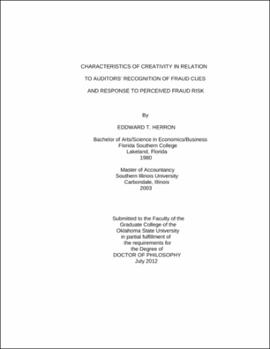| dc.contributor.advisor | Cornell, Robert M. | |
| dc.contributor.author | Herron, Eddward T. | |
| dc.date.accessioned | 2013-11-26T08:31:16Z | |
| dc.date.available | 2013-11-26T08:31:16Z | |
| dc.date.issued | 2012-07 | |
| dc.identifier.uri | https://hdl.handle.net/11244/7137 | |
| dc.description.abstract | The research examines whether differences in scores for each of four recognized domains of creativity (assessed with standardized scales measuring workplace support of creativity, personality, degree of creative ideation, and learning style) are associated with auditors' recognition of fraud cues embedded in an audit narrative and, then, audit plan changes in response to auditors' perceived fraud risk from reading that same audit narrative. Findings suggest a significantly positive relationship between recognition of fraud cues and auditors' 1) personal commitment to work/employer, 2) creative ideation, and, 3) tolerance of ambiguity - and a negative relationship with auditors' 1) preference for order, and 2) close-mindedness. Similarly, a significantly positive relationship was found between responses to perceived fraud risk and auditors' 1) personal commitment to work/employer, and 2) creative ideation - but a negative relationship with auditors' scores for 1) close-mindedness, and 2) planning style of thinking. | |
| dc.description.abstract | Consequently, auditors who viewed their work as more than merely a job, were generally more creative in simple everyday ways, and were not so rigid in their thinking or the way they processed information were significantly better at both recognizing fraud cues and responding to fraud risks - as creativity theory would suggest. | |
| dc.description.abstract | The research used seventy-three practicing auditors as subjects to mitigate external validity problems. Findings provide an important theoretical extension of prior SAS no. 99 research, which focused only on brainstorming and analytical reasoning (two common tools to elicit creative behavior) - as well as significant practical benefits for the auditing profession in terms of auditor selection, assignment, and training. | |
| dc.format | application/pdf | |
| dc.language | en_US | |
| dc.rights | Copyright is held by the author who has granted the Oklahoma State University Library the non-exclusive right to share this material in its institutional repository. Contact Digital Library Services at lib-dls@okstate.edu or 405-744-9161 for the permission policy on the use, reproduction or distribution of this material. | |
| dc.title | Characteristics of creativity in relation to auditors' recognition of fraud cues and response to perceived fraud risk | |
| dc.contributor.committeeMember | Montgomery, Diane | |
| dc.contributor.committeeMember | Carter, David | |
| dc.contributor.committeeMember | Lacey, Bud | |
| osu.filename | Herron_okstate_0664D_12362.pdf | |
| osu.accesstype | Open Access | |
| dc.type.genre | Dissertation | |
| dc.type.material | Text | |
| dc.subject.keywords | audit | |
| dc.subject.keywords | creativity | |
| dc.subject.keywords | fraud | |
| thesis.degree.discipline | Accounting | |
| thesis.degree.grantor | Oklahoma State University | |
